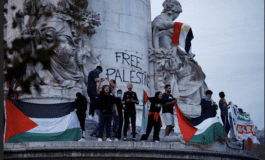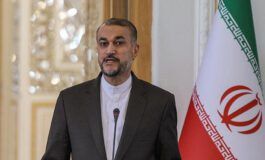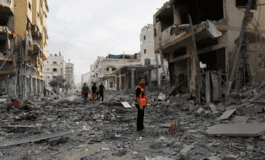TEL AVIV (LA Times) — As he inspected the Taj Mahal hotel after the 2008 terrorist attacks in Mumbai, India, and listened to a hotel manager bemoan the lack of adequate security preparations, Israeli export official Avi Hefetz saw a growth market in the making.

|
| A photo of Israeli security technology, MagShoe, a machine used in airports in Europe and Australia to detect weapons hidden in shoes without passengers having to remove their footwear. |
“We might be a small country, but we’re not small in this business,” said Hefetz, director of the Israel Export & International Cooperation Institute, a quasi-government business promotion group that last month organized the Homeland Security Conference, Israel’s first expo for domestic security providers. As the threat of terrorism spreads, Israel has moved aggressively to turn domestic security technology into one of its biggest exports. More than 400 Israeli companies export about $1.5 billion annually in domestic security goods and technology, including biometric devices, tear gas canisters, anti-intrusion systems, airport screening machines, explosives detectors and remote-controlled vehicles. Israel’s share of the $175 billion global domestic security market is less than 1 percent, but government and industry officials think they can increase that tenfold by ramping up marketing and promotion.
This year Israel sent a record nine trade delegations to India. When the president of Brazil’s Olympic Committee visited Israel last month, he was received by President Shimon Peres, who touted his nation’s security firms. “Unfortunately, we have a name in this area all around the world because we are living these issues day in and day out,” said Dani Werber, international marketing manager for IDO Security Inc., which makes MagShoe, a machine used in airports in Europe and Australia to detect weapons hidden in shoes without passengers having to remove their footwear. “But it’s not just a name, it’s also the proven technology,” Werber said. “Most of what Israeli companies sell is, again unfortunately, field-proven. Whether it’s dealing with a suicide bomb or metal detection, things work.”
Israel is focusing its efforts on Brazil, which could spend as much as $3 billion on security for the 2014 World Cup soccer tournament and the 2016 Summer Olympics, and on India, whose annual internal security budget in the government and corporate arenas now tops $1 billion, experts estimate. Israeli-made 360-degree cameras have been installed on Indian oil rigs, and Mumbai government officials sent police officers to Israel for training after the 2008 terrorist attacks, Hefetz said. The Israeli firm Magal Security Systems Ltd., which made its name with perimeter-intrusion systems along Israel’s tense borders with Lebanon and the Gaza Strip, is installing its wares at 11 airports in China.
Nice Systems, an Israeli company that sells data-analysis and surveillance systems, counts among its customers the Eiffel Tower, the Statue of Liberty, Bank of America and the New York City Police Department. “Israel’s domestic market is tiny,” said Alon Slonim, vice president for international marketing at Ispra, which manufactures tear gas and other riot gear. “The only way to grow is to export.” Competing with mass-producing firms in nations such as the United States and China is challenging, Slonim said, so Israeli companies need to be creative to stand out. For example, based on Israel’s experience in dealing with Palestinian protests and uprisings against Israel’s occupation of the West Bank, Ispra designed tear gas canisters made of softer plastic to reduce the risk of injury if the projectiles hit demonstrators. The canisters are also designed to blow up shortly after they disperse their gas, to discourage protesters from picking them up and tossing them back at police.
Ispra was among dozens of Israeli firms presenting their products at the security expo in Tel Aviv, which drew mayors, police chiefs and security officials from around the world. Among the offerings was document-scanning software from IntuView that not only translates Arabic text but also searches for key words and phrases, including names, dates and Qur’anic verses commonly cited by extremists, software engineer Amit Seker said. The U.S. Army has bought the software, he said. WeCU Technologies Ltd., another Israeli start-up, presented its camera-monitored airport kiosks, designed to detect “malicious intent” of users by tracking facial expressions, stress levels, breath and heart rate, and sweating in response to questions or images displayed on the screen.
Israel’s experience in combating Palestinian extremists has made Israeli companies somewhat expert in guerrilla tactics, rocket attacks and suicide bombers, said Doron Havazelet, director of the new Homeland Security Institute at Ben-Gurion University of the Negev. “The proximity of Israeli culture to Islamic culture produces a better understanding of the issues,” he said. “Israel is a country that stood at this front line earlier than most others.”





Leave a Reply